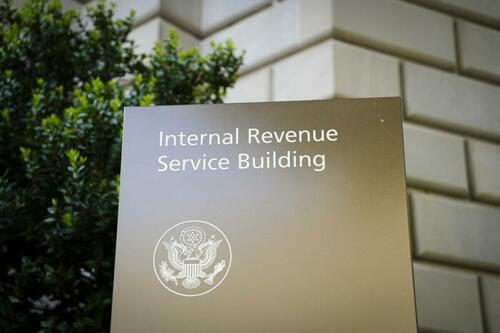
President Biden’s nominee for Inspector General for Tax Administration (TIGTA), David Johnson, promised to tackle allegations of IRS misconduct, including politically motivated audits and unfair targeting of small businesses, during his confirmation hearing before the Senate Finance Committee on Nov. 14. Johnson vowed to hold the IRS accountable for any abuse of power, ensuring that taxpayers are treated fairly.
At the hearing, Johnson addressed bipartisan concerns about the misuse of IRS authority, with lawmakers pressing him on the agency’s practices and adherence to directives aimed at protecting small businesses and low-income taxpayers from increased audit rates.
Political Targeting: A Top Priority
Finance Committee Chairman Sen. Ron Wyden (D-OR) kicked off the hearing by demanding to know how Johnson would address concerns about politically driven IRS actions.
"If you’re confirmed as Inspector General, what actions will you lead at TIGTA to ensure that Americans are not being targeted for audit or investigation based on their political affiliation?" Wyden asked.
Johnson pledged to investigate such allegations thoroughly, emphasizing the seriousness of any attempt to weaponize the IRS.
"I believe that one of the core responsibilities of any Inspector General, by statute, is to prevent fraud, waste, and abuse, and targeting of any American based on their political affiliation, to me, would be an extreme level of abuse," Johnson replied. "Anybody ordering the IRS or asking the IRS to target political opponents or take action based on political identity would be an abuse of power and would be something that TIGTA would play a role in preventing."
Johnson assured the committee that TIGTA would play a crucial role in preventing such practices, vowing to report findings to Congress and the public.
Small Business Owners Feeling the Squeeze
Sen. Marsha Blackburn (R-TN) raised the alarm over IRS audit practices affecting small businesses, particularly those earning less than $400,000 annually. Citing a 2022 directive from Treasury Secretary Janet Yellen promising not to increase audits for small businesses and lower-income households, Blackburn said her constituents remain skeptical.
"Several times on this committee, I’ve talked about the concerns that I hear from small businesses in Tennessee, and a lot of times this has to do with being wrongfully targeted by the IRS," Blackburn said - pointing to a recent TIGTA report revealing that the IRS has yet to finalize key definitions, such as what qualifies as a "small business," raising fears that audit rates could still rise. Blackburn pressed Johnson for a commitment to further review these audit processes.
"If you’re confirmed, will you commit to further reviewing these IRS audit processes to ensure compliance with that 2022 directive?" she asked.
Johnson agreed, pledging to follow up on TIGTA’s findings and brief Blackburn and other stakeholders on the results.
TIGTA Report Highlights Gaps in IRS Compliance
The TIGTA report referenced during the hearing painted a worrying picture of the IRS’s progress. While the agency has promised to shield small businesses from increased audits, delays in defining key terms and establishing a methodology jeopardize its ability to meet the directive’s requirements by fiscal year 2025.
The IRS has proposed defining small businesses as those with less than $10 million in assets, but this definition remains under discussion with no timeline for completion. TIGTA has urged the IRS to accelerate its efforts, warning that delays could lead to non-compliance with the 2022 directive.
In response, IRS Deputy Commissioner Douglas O’Donnell reaffirmed the agency’s commitment to the directive, noting steps to shift audit focus to high-income earners and large corporations.
"'The Commissioner has publicly committed that the IRS will comply with the Secretary’s directive not to increase audit rates above historic levels for small businesses or households earning less than $400,000," O’Donnell wrote in a July memorandum to TIGTA, adding that the IRS is working with Treasury to finalize the formal methodology for implementing the directive.
Small Businesses Still on Edge
Despite these assurances, Blackburn said small business owners remain uneasy. She highlighted constituents’ fears of being "entrapped" by the IRS amid concerns that increased funding for the agency—part of the Biden administration’s $80 billion IRS boost—has enabled the hiring of thousands of new tax enforcers.
Johnson acknowledged these fears, reiterating that TIGTA would ensure the IRS adheres to its promises. "Given that TIGTA has already issued a report on this very issue, it does seem appropriate for a follow-up," he said.
As Johnson’s confirmation process continues, lawmakers on both sides of the aisle will be watching closely to see whether his tenure at TIGTA can restore confidence in an agency increasingly under scrutiny. With audit fears looming large over small businesses, Johnson’s pledge to safeguard taxpayers may be put to the test sooner rather than later.
President Biden’s nominee for Inspector General for Tax Administration (TIGTA), David Johnson, promised to tackle allegations of IRS misconduct, including politically motivated audits and unfair targeting of small businesses, during his confirmation hearing before the Senate Finance Committee on Nov. 14. Johnson vowed to hold the IRS accountable for any abuse of power, ensuring that taxpayers are treated fairly.
At the hearing, Johnson addressed bipartisan concerns about the misuse of IRS authority, with lawmakers pressing him on the agency’s practices and adherence to directives aimed at protecting small businesses and low-income taxpayers from increased audit rates.
Political Targeting: A Top Priority
Finance Committee Chairman Sen. Ron Wyden (D-OR) kicked off the hearing by demanding to know how Johnson would address concerns about politically driven IRS actions.
“If you’re confirmed as Inspector General, what actions will you lead at TIGTA to ensure that Americans are not being targeted for audit or investigation based on their political affiliation?” Wyden asked.
Johnson pledged to investigate such allegations thoroughly, emphasizing the seriousness of any attempt to weaponize the IRS.
“I believe that one of the core responsibilities of any Inspector General, by statute, is to prevent fraud, waste, and abuse, and targeting of any American based on their political affiliation, to me, would be an extreme level of abuse,” Johnson replied. “Anybody ordering the IRS or asking the IRS to target political opponents or take action based on political identity would be an abuse of power and would be something that TIGTA would play a role in preventing.”
Johnson assured the committee that TIGTA would play a crucial role in preventing such practices, vowing to report findings to Congress and the public.
Small Business Owners Feeling the Squeeze
Sen. Marsha Blackburn (R-TN) raised the alarm over IRS audit practices affecting small businesses, particularly those earning less than $400,000 annually. Citing a 2022 directive from Treasury Secretary Janet Yellen promising not to increase audits for small businesses and lower-income households, Blackburn said her constituents remain skeptical.
“Several times on this committee, I’ve talked about the concerns that I hear from small businesses in Tennessee, and a lot of times this has to do with being wrongfully targeted by the IRS,” Blackburn said – pointing to a recent TIGTA report revealing that the IRS has yet to finalize key definitions, such as what qualifies as a “small business,” raising fears that audit rates could still rise. Blackburn pressed Johnson for a commitment to further review these audit processes.
“If you’re confirmed, will you commit to further reviewing these IRS audit processes to ensure compliance with that 2022 directive?” she asked.
Johnson agreed, pledging to follow up on TIGTA’s findings and brief Blackburn and other stakeholders on the results.
TIGTA Report Highlights Gaps in IRS Compliance
The TIGTA report referenced during the hearing painted a worrying picture of the IRS’s progress. While the agency has promised to shield small businesses from increased audits, delays in defining key terms and establishing a methodology jeopardize its ability to meet the directive’s requirements by fiscal year 2025.
The IRS has proposed defining small businesses as those with less than $10 million in assets, but this definition remains under discussion with no timeline for completion. TIGTA has urged the IRS to accelerate its efforts, warning that delays could lead to non-compliance with the 2022 directive.
In response, IRS Deputy Commissioner Douglas O’Donnell reaffirmed the agency’s commitment to the directive, noting steps to shift audit focus to high-income earners and large corporations.
“‘The Commissioner has publicly committed that the IRS will comply with the Secretary’s directive not to increase audit rates above historic levels for small businesses or households earning less than $400,000,” O’Donnell wrote in a July memorandum to TIGTA, adding that the IRS is working with Treasury to finalize the formal methodology for implementing the directive.
Small Businesses Still on Edge
Despite these assurances, Blackburn said small business owners remain uneasy. She highlighted constituents’ fears of being “entrapped” by the IRS amid concerns that increased funding for the agency—part of the Biden administration’s $80 billion IRS boost—has enabled the hiring of thousands of new tax enforcers.
Johnson acknowledged these fears, reiterating that TIGTA would ensure the IRS adheres to its promises. “Given that TIGTA has already issued a report on this very issue, it does seem appropriate for a follow-up,” he said.
As Johnson’s confirmation process continues, lawmakers on both sides of the aisle will be watching closely to see whether his tenure at TIGTA can restore confidence in an agency increasingly under scrutiny. With audit fears looming large over small businesses, Johnson’s pledge to safeguard taxpayers may be put to the test sooner rather than later.
Loading…





